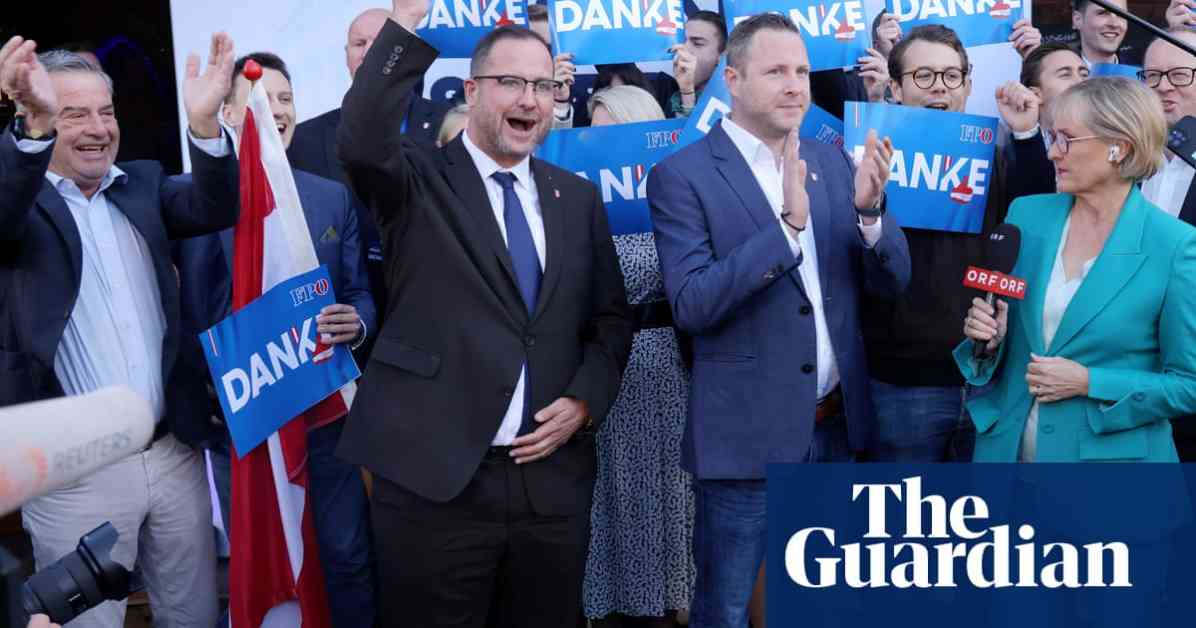Far-right Freedom Party Emerges Victorious in Austrian Election
In a surprising turn of events, the far-right Freedom Party (FPÖ) has emerged as the winner of the latest Austrian election, marking the first time since the Nazi era that a far-right party has secured the most votes in the country. The FPÖ’s victory comes amidst a wave of public discontent over issues such as migration and the rising cost of living, propelling them to victory over the centre-right People’s Party (ÖVP).
The FPÖ, known for its pro-Kremlin and anti-Islam stance, secured 28.8% of the votes, surpassing the ruling ÖVP led by Chancellor Karl Nehammer, which garnered 26.3% of the votes, according to near-complete results. The opposition Social Democratic Party recorded its worst-ever result at 21.1%, while the liberal NEOS party received around 9% of the votes. Despite recent flooding and the climate crisis being at the forefront of public concern, the Greens, who are part of the government coalition, only managed to secure 8.3% of the votes, landing them in fifth place.
The Communist Party and the apolitical Beer Party seemed unlikely to meet the 4% threshold required for representation in parliament. Voter turnout was high, standing at approximately 78%.
Factors Contributing to FPÖ’s Victory
The FPÖ’s success in the election can be attributed to a variety of factors, including the party’s ability to capitalize on fears surrounding migration, asylum, and crime. The cancellation of three Taylor Swift concerts in Vienna due to an alleged Islamist terror plot further fueled public concerns, contributing to the FPÖ’s surge in popularity.
Additionally, economic issues such as mounting inflation, tepid economic growth, and lingering resentment over strict government measures implemented during the Covid-19 pandemic played a significant role in shaping the outcome of the election. The FPÖ’s lead candidate, Herbert Kickl, ran a polarizing campaign, drawing parallels to the Austrian-born Adolf Hitler and emphasizing a populist message that resonated with voters.
Kickl’s promise to form a government with any party in parliament signals a potential shift in Austria’s political landscape, with the FPÖ poised to play a prominent role in shaping the country’s future direction. The FPÖ’s rise mirrors a broader trend of right-wing populism gaining momentum across Europe, with Hungary’s Viktor Orbán serving as a model for the party’s approach to governance.
Challenges and Opportunities Ahead
While the FPÖ’s victory marks a significant milestone in Austrian politics, the party faces challenges in forming a government due to its failure to secure an absolute majority. The ÖVP, which has not ruled out collaborating with the far right in the past, may present a potential ally for the FPÖ in government formation.
However, Chancellor Nehammer has expressed reservations about the prospect of Kickl becoming chancellor, setting the stage for a potential showdown between the two parties. The FPÖ may need to make concessions, such as jettisoning Kickl or assuming a lesser role in government, to gain the ÖVP’s support.
The outcome of coalition negotiations in the coming weeks will determine the future trajectory of Austrian politics. Whether the ÖVP forms an alliance with the FPÖ or opts for a three-way coalition with smaller centrist parties remains to be seen. Regardless of the outcome, the FPÖ’s victory signals a shift in the country’s political landscape and sets the stage for a period of change and uncertainty.
As Austria navigates the aftermath of the election, the international community will be closely watching to see how the country’s new government shapes its policies and relationships with neighboring nations. The FPÖ’s ascent to power raises questions about the future of Austria’s position within the European Union and its stance on key issues such as migration, security, and economic policy.
Overall, the FPÖ’s victory in the Austrian election represents a significant turning point in the country’s political history, with far-reaching implications for the nation and its place within the broader European context. The coming months will be crucial in determining how Austria moves forward in the wake of this historic election.












